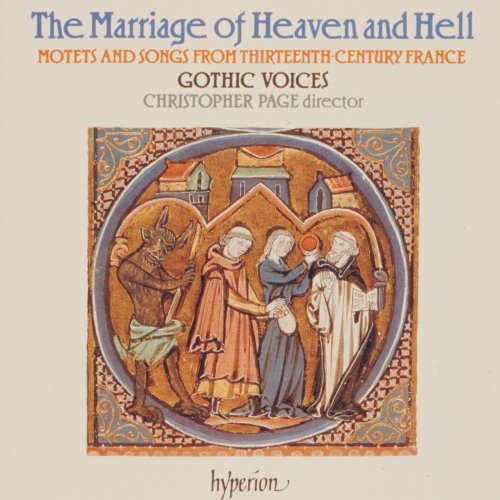
Gothic Voices, Christopher Page - The Marriage of Heaven and Hell: Motets & Songs from 13th-Century France (1990)
BAND/ARTIST: Gothic Voices, Christopher Page
- Title: The Marriage of Heaven and Hell: Motets & Songs from 13th-Century France
- Year Of Release: 1990
- Label: Hyperion
- Genre: Classical
- Quality: flac lossless (tracks) +Booklet
- Total Time: 00:46:25
- Total Size: 198 mb
- WebSite: Album Preview
Tracklist
01. Je ne chant pas / Talens m'est pris / APTATUR / OMNES
02. Trois sereurs / Trois sereurs / Trois sereurs / PERLUSTRAVIT
03. En tous tans que vente bise
04. Plus bele que flors / Quant revient / L'autrier jouer / FLOS FILIUS EIUS
05. Par un matinet / Hé, sire! / Hé, bergier! / EIUS
06. De la virge Katerine / Quant froidure / Agmina milicie / AGMINA
07. Trop volentiers chanteroie
08. Ave parens / Ad gratie / AVE MARIA
09. Super te Ierusalem / Sed fulsit virginitas / PRIMUS TENOR / DOMINUS
10. A vous douce debonnaire
11. Mout souvent / Mout ai esté en dolour / MULIERUM
12. Can vei la lauzeta mover
13. Quant voi l'alouete / Diex! je ne m'en partiré ja / NEUMA
14. En non Dieu / Quant voi la rose / NOBIS
15. Autres que je ne sueill fas
16. Je m'en vois / Tels a mout / OMNES
17. Festa januaria
Our cover shows a young cleric, perhaps a student at the university of Paris, offering money to a girl who, to judge by the drum in her hand, is off to take part in a ring-dance, or carole. To the left stands a libidinous demon, while to their right a friar holds an open book of the Old Testament and raises his hand in warning. This Parisian picture is a fine emblem of the music on this record: the motet of the thirteenth century. Like the student and the girl, the motet of the years between 1200 and 1300 was caught between the lure of the secular and the summons of the sacred—between Heaven and Hell. Although it developed from the liturgical music of Paris, the motet form has come down to us with texts of every kind: some devout, some lascivious, some facetious, some wistfully romantic. The music, we may be sure, often has something in common with the songs of the ring-dances, the caroles...
01. Je ne chant pas / Talens m'est pris / APTATUR / OMNES
02. Trois sereurs / Trois sereurs / Trois sereurs / PERLUSTRAVIT
03. En tous tans que vente bise
04. Plus bele que flors / Quant revient / L'autrier jouer / FLOS FILIUS EIUS
05. Par un matinet / Hé, sire! / Hé, bergier! / EIUS
06. De la virge Katerine / Quant froidure / Agmina milicie / AGMINA
07. Trop volentiers chanteroie
08. Ave parens / Ad gratie / AVE MARIA
09. Super te Ierusalem / Sed fulsit virginitas / PRIMUS TENOR / DOMINUS
10. A vous douce debonnaire
11. Mout souvent / Mout ai esté en dolour / MULIERUM
12. Can vei la lauzeta mover
13. Quant voi l'alouete / Diex! je ne m'en partiré ja / NEUMA
14. En non Dieu / Quant voi la rose / NOBIS
15. Autres que je ne sueill fas
16. Je m'en vois / Tels a mout / OMNES
17. Festa januaria
Our cover shows a young cleric, perhaps a student at the university of Paris, offering money to a girl who, to judge by the drum in her hand, is off to take part in a ring-dance, or carole. To the left stands a libidinous demon, while to their right a friar holds an open book of the Old Testament and raises his hand in warning. This Parisian picture is a fine emblem of the music on this record: the motet of the thirteenth century. Like the student and the girl, the motet of the years between 1200 and 1300 was caught between the lure of the secular and the summons of the sacred—between Heaven and Hell. Although it developed from the liturgical music of Paris, the motet form has come down to us with texts of every kind: some devout, some lascivious, some facetious, some wistfully romantic. The music, we may be sure, often has something in common with the songs of the ring-dances, the caroles...
As a ISRA.CLOUD's PREMIUM member you will have the following benefits:
- Unlimited high speed downloads
- Download directly without waiting time
- Unlimited parallel downloads
- Support for download accelerators
- No advertising
- Resume broken downloads


